From her thoughts on a black woman becoming First Lady to marital struggles with her husband Barack, Michelle Obama hasn’t held back in her memoir, which is being praised as honest and telling, Becoming.

Michelle Obama joined the ranks of former United States first ladies-turned-authors on Tuesday with the launch of her new memoir, Becoming.
The 421-page book published by Crown Publishing has been described as offering a more personal invitation into her life than any she’s previously extended.
She takes us through her life from Michelle Robinson, the South Side Chicagoan who relished Stevie Wonder’s Talking Book just as much as she enjoyed talking back to steely adults, to the unflappable former first lady we know her as. It’s both humbling and affirming to bear witness to the very human makings of Obama.
The book has already become a bestseller and is also TV czar Oprah Winfrey’s ‘Book of the Month’.
Here are some interesting excerpts from her book.
How Barack proposed to her
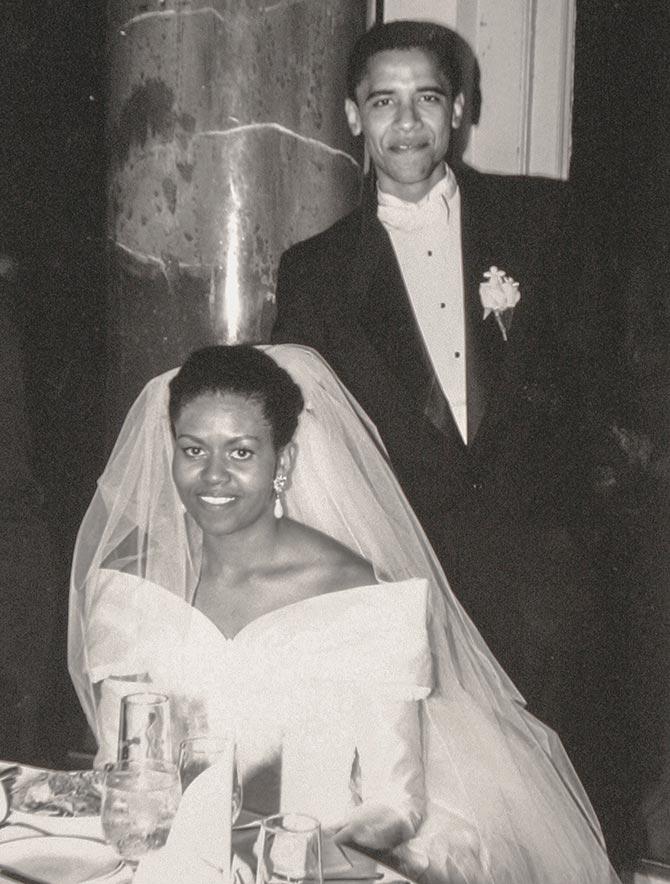
As we were reaching the end of the meal, Barack smiled at me and raised the subject of marriage. He reached for my hand and said that as much as he loved me with his whole being, he still didn't really see the point. Instantly, I felt the blood rise in my cheeks. It was like pushing a button in me -- the kind of big blinking red button you might find in some sort of nuclear facility surrounded by warnings signs and evacuation maps. Really? We were going to do this now?
... Eventually, our waiter came around holding a dessert plate, covered by a silver lid. He slid it in front of me and lifted the cover. I was almost too miffed to even look down, but when I did, I saw a dark velvet box where the chocolate cake was supposed to be. Inside was a diamond ring. Barack looked at me playfully. He’d baited me. It had all been a ruse. It took me a second to dismantle my anger and slide into joyful shock. He’d riled me up because this was the very last time he would invoke his inane marriage argument, ever again, as long as we both should live.
She did not think Barack could win the presidency
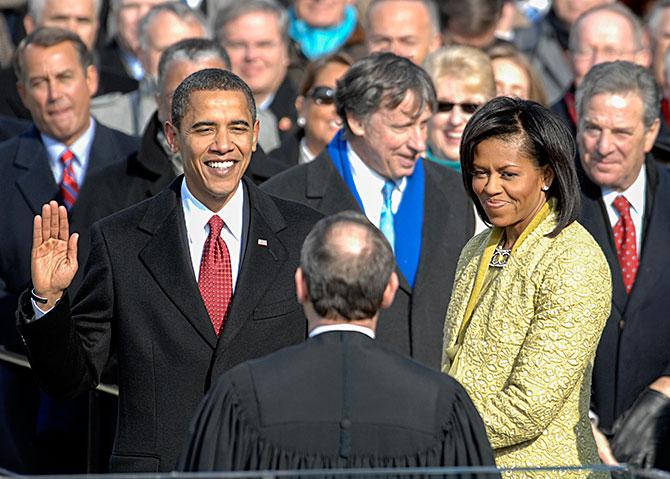
I said yes, though I was at the same time harbouring a painful thought, one I wasn’t ready to share: I supported him in campaigning, but I also felt certain he wouldn’t make it all the way
... He spoke so often and so passionately of healing our country’s divisions, appealing to a set of higher ideals he believed were innate in most people. But I’d seen enough of the divisions to temper my own hopes. Barack was a black man in America, after all. I didn’t really think he could win.”
The Sandy Hook shooting was one of the toughest days in office
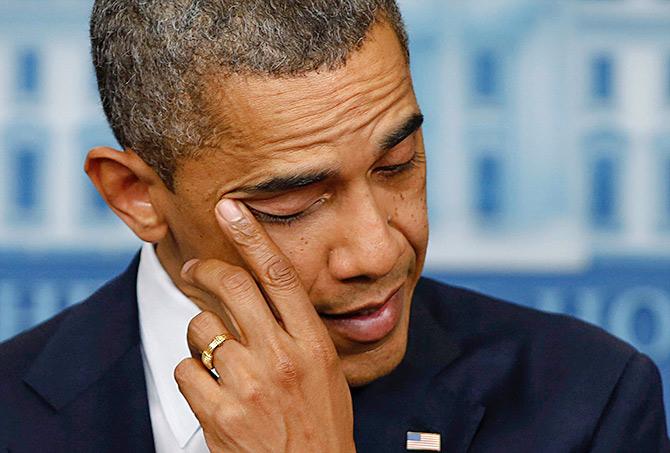
This would be the only time in eight years that he’d request my presence in the middle of a workday, the two of us rearranging our schedules to be alone together for a moment of dim comfort.
Usually, work was work and home was home, but for us, as for many people, the tragedy in Newtown shattered every window and blew down every fence.
When I walked into the Oval Office, Barack and I embraced silently. There was nothing to say. No words.
Staying upright after Newtown was probably the hardest thing he’d ever had to do. When Malia and Sasha came home from school later that day, Barack and I met them in the residence and hugged them tight, trying to mask the urgency of our need just to touch them.
It was hard to know what to say or not say to our girls about the shooting. Parents all around the country, we knew, were grappling with the same thing.
The Obamas went through couples counselling
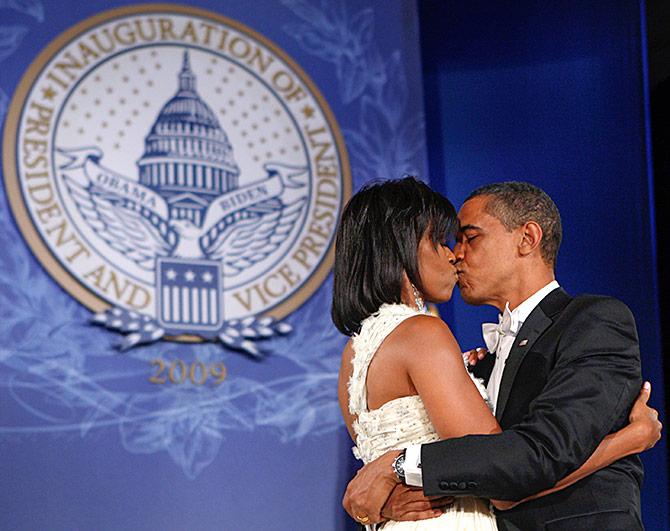
I feel vulnerable all the time.
... And I had to learn how to express that to my husband, to tap into those parts of me that missed him -- and the sadness that came from that -- so that he could understand. He didn’t understand distance in the same way. You know, he grew up without his mother in his life for most of his years, and he knew his mother loved him dearly, right? I always thought love was up close. Love is the dinner table, love is consistency, it is presence. So I had to share my vulnerability and also learn to love differently. It was an important part of my journey of becoming. Understanding how to become us.
Michelle’s miscarriage and having Sasha and Malia through IVF
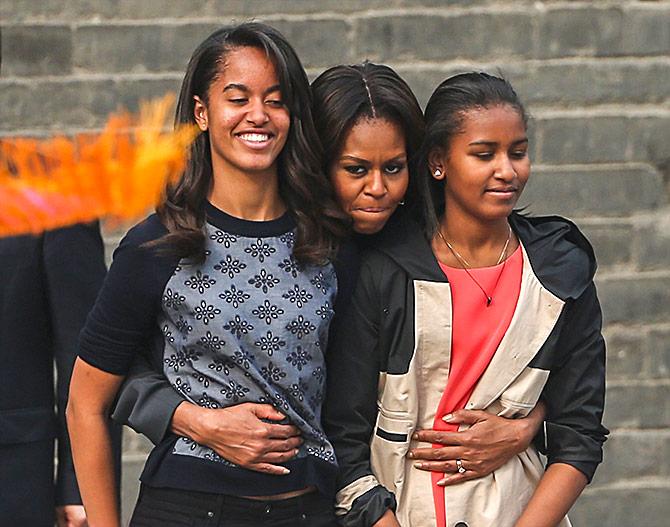
We were trying to get pregnant and it wasn’t going well.
We had one pregnancy test come back positive, which caused us both to forget every worry and swoon with joy, but a couple of weeks later I had a miscarriage, which left me physically uncomfortable and cratered any optimism we felt.
A miscarriage is lonely, painful, and demoralising almost on a cellular level. When you have one, you will likely mistake it for a personal failure, which it is not. Or a tragedy, which, regardless of how utterly devastating it feels in the moment, it also is not. What nobody tells you is that miscarriage happens all the time, to more women than you’d ever guess, given the relative silence around it.
She later reveals that she was able to conceive their two daughters, Sasha and Malia, through in vitro fertilisation.
Michelle explains her White House style strategy
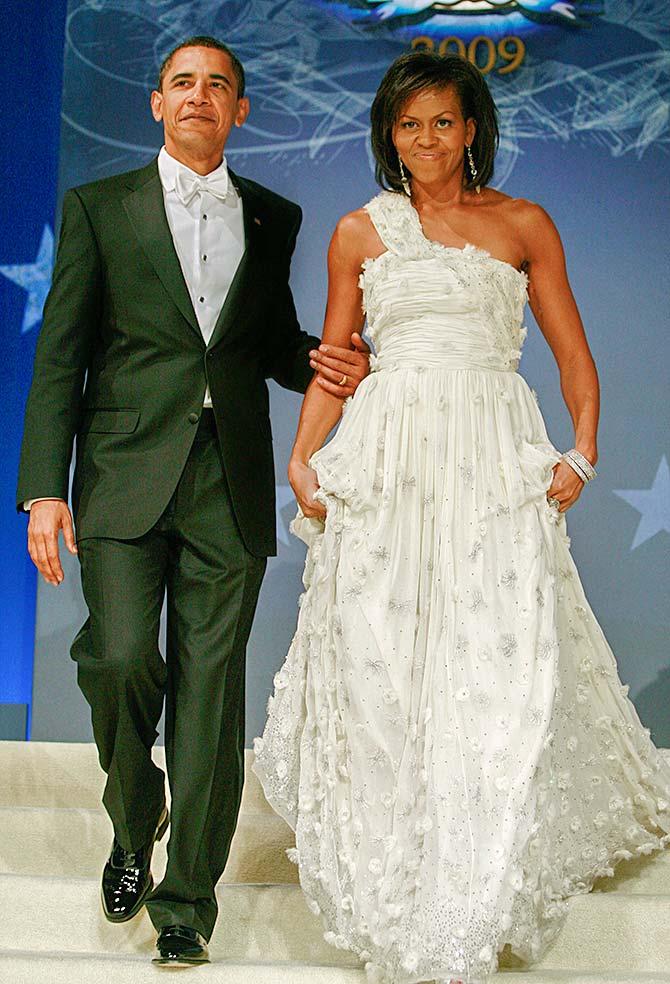
Sometime during Barack’s campaign, people began paying attention to my clothes. Or at least the media paid attention, which provoked all manner of commentary across the internet. My pearls, my belts, my cardigans, my off-the-rack dresses from J Crew, my apparently brave choice of white for an inaugural gown -- all seemed to trigger a slew of opinions and instant feedback. I wore a sleeveless aubergine dress to Barack’s address to the joint session of Congress and a sleeveless black sheath dress for my official White House photo, and suddenly my arms were making headlines.
It seemed that my clothes mattered more to people than anything I had to say. In London, I’d stepped offstage after having been moved to tears while speaking to the girls at the Elizabeth Garrett Anderson School, only to learn that the first question directed to one of my staffers by a reporter had been “Who made her dress?"
This stuff got me down, but I tried to reframe it as an opportunity to learn, to use what power I could find inside a situation I’d never have chosen for myself. If people flipped through a magazine primarily to see the clothes I was wearing, I hoped they’d also see the military spouse standing next to me or read what I had to say about children’s health.
... I paid for all my own clothes and accessories -- with the exception of some items like the couture-level gowns I wore to formal events, which were lent to me by the designers and would later be donated to the National Archives, thus adhering to White House ethics guidelines. When it came to my choices, I tried to be somewhat unpredictable, to prevent anyone from ascribing any sort of message to what I wore. It was a thin line to walk. I was supposed to stand out without overshadowing others, to blend in but not fade away. As a black woman, too, I knew I’d be criticised if I was perceived as being showy and high-end, and I’d also be criticised if I was too casual. So I mixed it up.
I came to depend heavily on Meredith but also equally on Johnny Wright, my fast-talking, hard-laughing hurricane of a hairdresser, and Carl Ray, my soft-spoken and meticulous makeup artist. Together, the three of them (dubbed by my larger team “the trifecta”) gave me the confidence I needed to step out in public each day, all of us knowing that a slipup would lead to a flurry of ridicule and nasty comments. I never expected to be someone who hired others to maintain my image, and at first the idea was discomfiting. But I quickly found out a truth that no one talks about: Today, virtually every woman in public life-politicians, celebrities, you name it-has some version of Meredith, Johnny, and Carl. It’s all but a requirement, a built-in fee for our societal double standard.
Michelle on Trump
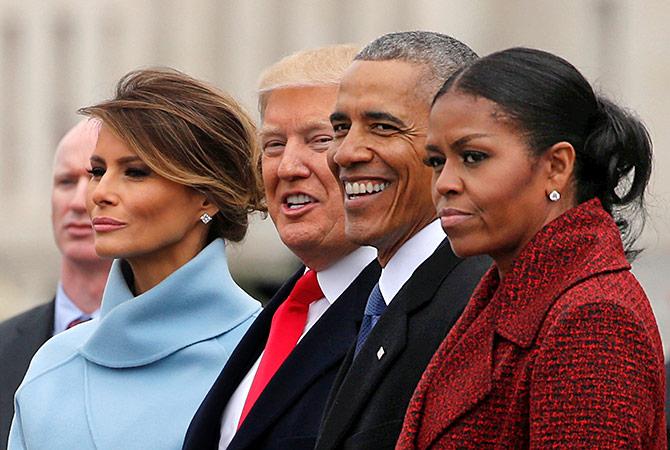
The whole thing was crazy and mean-spirited, of course, its underlying bigotry and xenophobia hardly concealed. But it was also dangerous, deliberately meant to stir up the wingnuts and kooks. ... Donald Trump, with his loud and reckless innuendos, was putting my family’s safety at risk. And for this, I’d never forgive him.
-- on Trump’s efforts trying to doubt Obama as a US citizen
I just wish more people had turned out to vote. And I will always wonder about what led so many women, in particular, to reject an exceptionally qualified female candidate and instead choose a misogynist as their president. But the result was now ours to live with.
-- on Trump’s victory
The vibrant diversity of the two previous inaugurations was gone, replaced by what felt like a dispiriting uniformity, the kind of overwhelmingly white and male tableau I’d encountered so many times in my life – especially in the more privileged spaces, the various corridors of power I’d somehow found my way into since leaving my childhood home. What I knew from working in professional environments … is that sameness breeds more sameness, until you make a thoughtful effort to counteract it. “Someone from Barack’s administration might have said that the optics there were bad – that what the public saw didn’t reflect the president’s reality or ideals. But in this case, maybe it did. Realising it, I made my own optic adjustment: I stopped even trying to smile.
-- on not smiling at Trump’s inauguration
Michelle for US president in 2020?
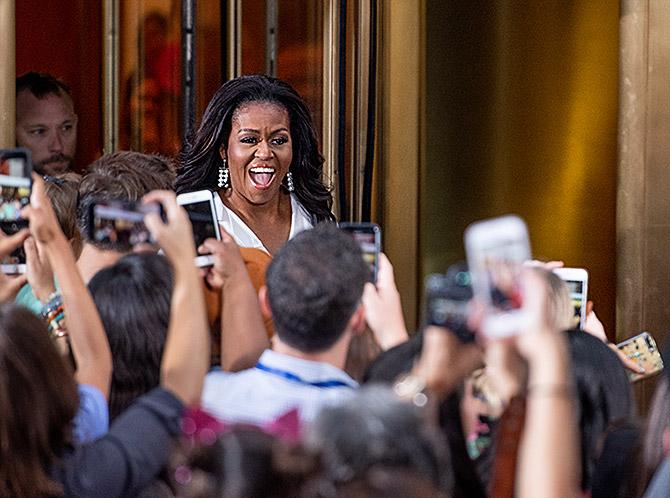
Because people often ask, I’ll say it here directly: I have no intention of running for office, ever. I’ve never been a fan of politics, and my experience over the last 10 years has done little to change that.
I continue to be put off by the nastiness -- the tribal segregation of red and blue, this idea that we’re supposed to choose one side and stick to it, unable to listen and compromise, or sometimes even to be civil. I do believe that at its best, politics can be a means for positive change, but this arena is just not for me.











 © 2025
© 2025